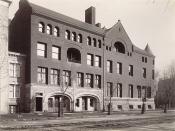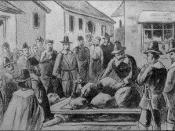Elizabeth should not have tried to convince John Proctor to confess to witchcraft nor should she try to convince him to hold his tongue and die. Elizabeth Proctor, as wife of John, should have done exactly what she did do. She left her opinion out and allowed John to decide for himself. Elizabeth, to John, said, "It is not my soul, John, it is yours. Only be sure of this, for I know it now: whatever you will do, it is a good man does it" (126). By saying that to John he is moved to tears because he knows that whatever fate he chooses Elizabeth will be supporting him. When the time comes, John says that he will confess. This news pleases Parris, Danforth, and Hale greatly. When they get the document for John to sign legitimatizing his confession, he refuses to sign it. He does sign the paper, but later tears it up realizing his true belief in himself and his judgement.
John Proctor hangs because of the way he denied his involvement with the devil.
When a conflict arises many people stand back and watch as their beliefs and opinions are ignored, but in few instances one person will stand up for themselves. John Proctor is that man who stands up and becomes a martyr. John Proctor, a man with strong beliefs, does not give the judges his signed confession but instead tears it up in their faces even though being untrue may have been the only way to stay alive. Just as Giles Corey does, John Proctor dies a martyr. John held strong beliefs in truth and did not give up any of his friends. Even at the beginning John Proctor does not hesitate to state his opinion, "I like not the smell of...


